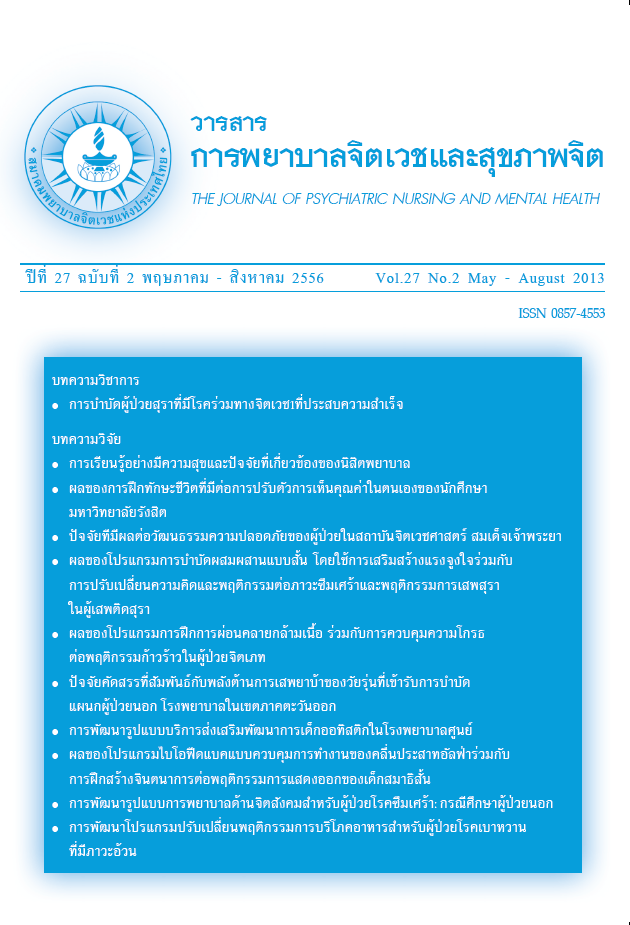ผลของโปรแกรมการบำบัดผสมผสานแบบสั้นโดยใช้การเสริมสร้างแรงจูงใจร่วมกับการปรับเปลี่ยนความคิดและพฤติกรรมต่อภาวะซึมเศร้าและพฤติกรรมการเสพสุราในผู้เสพติดสุรา
Main Article Content
บทคัดย่อ
การวิจัยกึ่งทดลองครั้งนี้มีวัตถุประสงค์เพื่อศึกษาผลของโปรแกรมการบำบัดผสมผสานแบบสั้นโดยใช้การเสริมสร้างแรงจูงใจร่วมกับการปรับเปลี่ยนความคิดและพฤติกรรมต่อภาวะซึมเศร้าและพฤติกรรมการเสพสุราในผู้เสพติดสุรา กลุ่มตัวอย่างเป็นผู้เสพติดสุราที่เข้ารับการรักษาที่แผนกผู้ป่วยนอก สถาบันธัญญารักษ์ จำนวน 36 คน ได้รับการจับคู่และสุ่มเข้ากลุ่มทดลองและกลุ่มควบคุมกลุ่มละ 18 คน กลุ่มทดลองได้รับโปรแกรมการบำบัดผสมผสานแบบสั้นฯที่ผู้วิจัยพัฒนาขึ้น ส่วนกลุ่มควบคุมได้รับการพยาบาลตามปกติ เครื่องมือที่ใช้ในการวิจัย คือ 1) โปรแกรมการบำบัดผสมผสานแบบสั้นฯ 2) แบบประเมินภาวะซึมเศร้าของ Beck 3) แบบประเมินพฤติกรรมการเสพสุรา (AUDIT) 4) แบบประเมินความคิดอัตโนมัติด้านลบ และ 5) แบบวัดขั้นตอนของความพร้อมในการเปลี่ยนแปลงและความต้องการการรักษา (SOCRATES – 8A) แบบประเมินทั้ง 4 ชุดมีค่าความเที่ยงสัมประสิทธิ์อัลฟาของครอนบาค เท่ากับ .81, .71, .94 และ .88 ตามลำดับ วิเคราะห์ข้อมูลโดยใช้สถิติที
ผลการวิจัยสรุปได้ดังนี้ 1. ภาวะซึมเศร้าและพฤติกรรมการเสพสุราของผู้เสพติดสุราหลังได้รับโปรแกรมการบำบัดผสมผสานแบบสั้นฯ ต่ำกว่าก่อนได้รับโปรแกรมการบำบัดผสมผสานแบบสั้นฯ อย่างมีนัยสำคัญทางสถิติที่ระดับ .05
2. ภาวะซึมเศร้าและพฤติกรรมการเสพสุราของผู้เสพติดสุราหลังได้รับโปรแกรมการบำบัดผสมผสานแบบสั้นฯลดลงกว่ากลุ่มที่ได้รับการพยาบาลตามปกติ อย่างมีนัยสำคัญทางสถิติที่ระดับ .05
Abstract
The purpose of this quasi – experimental research were to study the effect of brief intervention program using integrated motivational interviewing and cognitive behavioral restructuring on depression and alcohol consumption among alcohol dependence. The sample were 36 alcohol dependence patients recruited from out-patient department, Thanyarak Institute. The samples were matched-pair and then randomly assigned into experimental group and control group, 18 in each group. The experimental group received brief intervention program developed by the researcher. The control group received regular caring activity. The research instruments consisted of: 1) Brief intervention program, 2) Beck depressive inventory scale, 3) Alcohol Use Disorder Identification Test 4) Automatic Thought Questionnaire and 5) The Stage of Change Readiness and Treatment Eagerness Scale. All instruments were tested for content validity by 5 experts. Cronbach’s alpha coefficient reliability of four latter instruments were .81, .71, .94 and .88 respectively. The t-test was used in data analysis.
Major findings were as follow: 1) The depression and alcohol consumption among alcohol dependence after participating in program was significantly lower than that before (p< .05).
2) The depression and alcohol consumption among alcohol dependence after participated in program was lower than those who participated in the regular caring activities (p < .05).Article Details
บทความที่ได้รับการตีพิมพ์แล้ว เป็นลิขสิทธิ์ของสมาคมพยาบาลจิตเวชแห่งประเทศไทย


